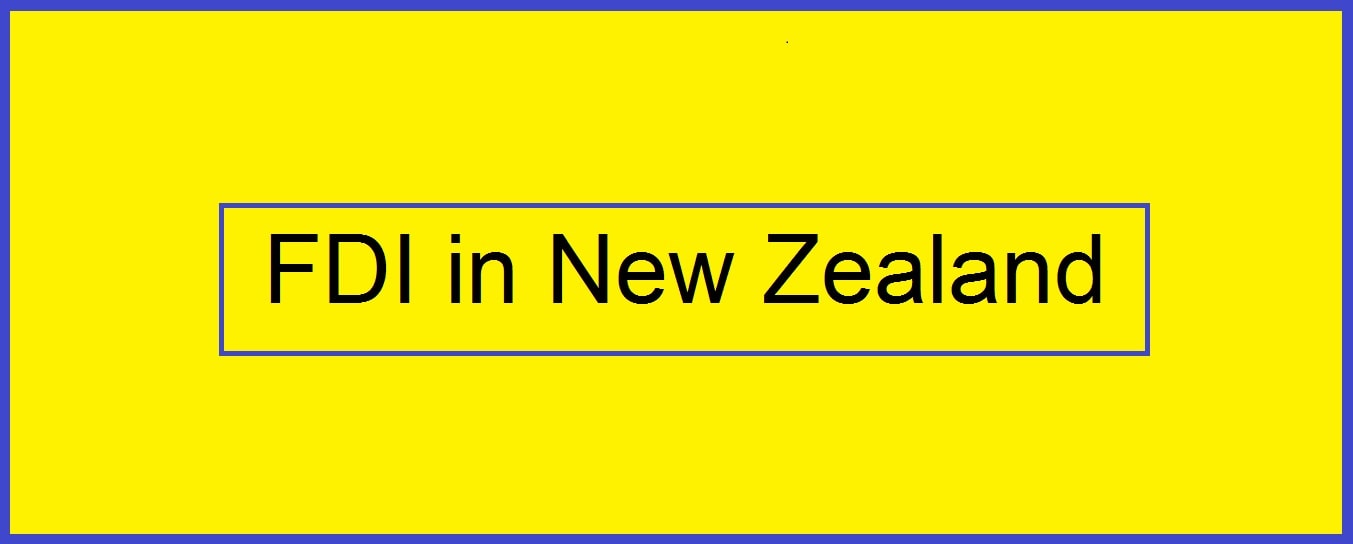As foreign direct investment, New Zealand is one of the freest countries to attract businesses and industries among the OECD [Organisation for Economic Cooperation and Development] nations. The Economic Freedom Index [EFI] 2017 of Heritage Foundation-Wall Street Journal ranks New Zealand 3rd [in the top five free economy group] among 180 world nations. With 99% literacy rate it has a huge wealth of talented workforce.

Foreign Direct Investment FDI
The investment can be made by a company of a country or an individual of a country in another country through establishing or participating in a business. For Foreign Direct Investments, the free economies of the world are usually targeted by the businesses. The FDI flows are measured in USD and as a share of GDP. FDI creates stable and long-lasting links between economies.
The Rankings
► The World Bank
| Indices | Rank in 2017 | Rank in 2016 |
| Overall | 1 | 1 |
| Starting a Business | 1 | 1 |
| Dealing with construction permits | 1 | 1 |
| Getting Electricity | 34 | 28 |
| Getting Credit | 1 | 1 |
| Protecting Minority Investors | 1 | 1 |
| Paying Taxes | 11 | 13 |
► Global Competitiveness Report [GCR] of World Economic Forum [2016-2017 editions] ranked the New Zealand 13th out of 138 countries of the world.
► UNDP’s HDI [Human Development Index] ranked the New Zealand 13th out of 168 countries of the world.
The FDI Inflows to New Zealand
Foreign Direct Investment in New Zealand increased by 1441 NZD Million in the Q2 of 2017. New Zealand's FDI stock is practically double that of Australia and Canada and three times more than that of the Scandinavian countries in relation to its GDP. FDI inflows to New Zealand nose-dived sharply from 2014 to 2015 after considerable hiking as high as USD 2.7 billion in 2013. In 2016, FDI inflows to New Zealand took a record up-ward turn as the figure exceeded USD 3 billion.
Most of the FDI inflows in New Zealand originated from Canada, Australia, Hong Kong, Japan, and the Cayman Islands.
Why New Zealand, the Pros and Cons
In the Economic Freedom Index of Heritage Foundation, New Zealand ranked 3rd among the top five free economies in the world. New Zealand has an open, free and highly transparent economy to conduct trade and commerce with ease and without unnecessary hassles. Apart from few exceptions, foreign investors can invest in any sector of the country and with no limits on foreign ownership or control.
Owing to the commitment of the major political parties of the country, all transactions are open and transparent, thus minimal corruption is experienced. New Zealand ranked 2nd out of 176 countries of the world in the Corruption Perception Index 2016 of the Transparency International. Indeed, it’s a highly credible achievement as far as foreign investments are concerned. Armed with numerous free-trade agreements [FTAs] and active government support for investment, New Zealand remains one of the choicest destinations for Foreign Direct Investment [FDI] Inflows. The FDIs in New Zealand can benefit from;
Since the financial crisis, the Government of New Zealand has made changes to the financial system to gearing up investors’ confidence. Some notable legislative actions have been initiated to paving the way for foreign investments into its territory. The actions included are as follows :
However, New Zealand has a very small and isolated domestic market to accommodate FDIs in broad spectrum. Moreover, New Zealand’s domestic capital base is too shallow to support industrial growth. The screening of FDIs also impacting upon investment inflows. The Government Measures to restrict FDIs also giving wrong signals to prospective foreign investors. New Zealand’s Overseas Investment Office [OIO] screens foreign investments that aiming at the acquisition of 25 percent or more ownership or a controlling interest in business that valued more than NZD100 million. As far as real state is concerned, Government approval also is necessitated for purchases of land over 5 hectares and land in certain sensitive or protected areas, or fishing quota.
The New Zealanders are very sensitive about Foreign investments. Resistance to further FDIs, especially farmland and the housing market is quite evident in various opinion polls.
Protection of Investors
So far, no case has been filed against New Zealand for non-complying any contract with overseas investors. Investors are entitled to lodge claims for compensation in case of any expropriation. Being a signatory to various bilateral agreements It has guaranteed the Freedom of enterprises in its territory
Comparison for the Protection of Investors
| Indices ** | New Zealand | OECD | USA | Germany |
| Index of Transaction Transparency | 10.0 | 6.0 | 7.0 | 5.0 |
| Index of Manager’s Responsibility | 9.0 | 5.0 | 9.0 | 5.0 |
| Index of Shareholders’ Power | 8.0 | 7.0 | 4.0 | 8.0 |
| Index of Investor Protection | 8.3 | 6.5 | 6.5 | 6.0 |
Investment Aid Agencies in the New Zealand to contact
Investment Aid Agency
Investment New Zealand, New Zealand Overseas Investment Commission
Ministry of Economic Development
Other Useful Resource
The most important is the government’s thinking about the FDIs in New Zealand. With positive approaches as reflected in the thoughts and policies of the government as of yet, the FDI inflows to New Zealand will grow, if not at least will remain steady in the coming days.
Any issue of Pvt ltd company registration in New Zealand, kindly contact us.